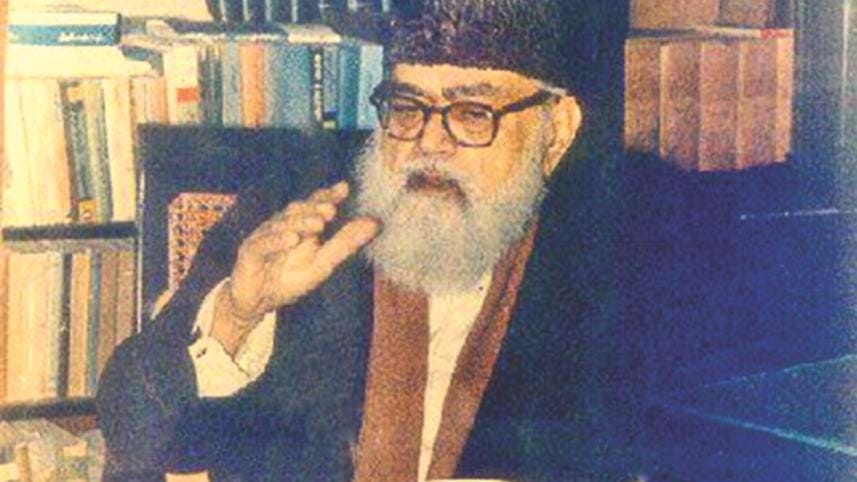Muslim Brotherhood follows Maududi's ideology: UK report

Jamaat-e-Islami founder Maududi's takfiri ideology that permits use of “extreme violence” for establishing Islam in the society was adopted and followed by Egypt's Muslim Brotherhood, a UK review reveals.
Sayyid Qutb, a key Brotherhood ideologue, drew on the thought of Indo-Pakistani Islamist theorist Abul A'la Maududi in 1940s.
Maududi founded Jamaat-e-Islami in British India as a religious political movement. After the creation of India and Pakistan in 1947, Maududi went to Pakistan and founded Jamaat-e-Islami, Pakistan. In independent Bangladesh, the party was first named Islamic Democratic League and finally Bangladesh Jamaat-e-Islami.
He remains the ideological guru of Jamaat in Bangladesh till date.
According to the review, takfiri ideology has consistently been understood as a doctrine permitting the stigmatisation of other Muslims as infidel or apostate, and of existing states as un-Islamic, and the use of extreme violence in the pursuit of the perfect Islamic society.
Qutb's views and thinking were explicitly endorsed by many senior Muslim Brotherhood figures, leading to a resurgence of takfiri ideology and inspiring many terrorist organisations, including al-Qaeda and its offshoots, as well as the assassins of former Egyptian president Anwar Sadat.
The Brotherhood, founded in Egypt in 1928, grew into an international organisation with chapters across the Muslim world.
The review, revealed on December 17 last year, said organisations associated with the Brotherhood were established in the UK more than 50 years ago and worked very closely with like-minded counterparts from South Asia to promote the work of Maududi and represent Jamaat-e-Islami.

Organisations which were originally associated with Maududi and the Jamaat continue to operate in this country. The UK Islamic Mission (UKIM) runs some 50 mosques. The Islamic Forum for Europe (IFE) is politically active, in particular in the local authorities of Tower Hamlets, and has supported the political party. Trustees of the large East London mosque and associated London Muslim Centre are also IFE members.
Former British ambassador to Saudi Arabia Sir John Jenkins and Charles Farr, the director general of the office for security and counter-terrorism in the Home Office, conducted the review focusing on Brotherhood in the Arab World, the UK and parts of Western Europe.
Jenkins found Brotherhood developed an international network, within and beyond the Islamic world. Europe became an important base for the growing Muslim Brotherhood global network.
“From its foundation the Muslim Brotherhood organised itself into a secretive 'cell' structure, with an elaborate induction and education programme for new members. It relied heavily on group solidarity and peer pressure to maintain discipline. This clandestine, centralised and hierarchical structure persists to this day.”
He says Muslim Brotherhood officially disowned violence; however, at all levels, it repeatedly defended Hamas attacks against Israel, including the use of suicide bombers and the killing of civilians.
“For some years the Muslim Brotherhood shaped the [then] new Islamic Society of Britain, dominated the Muslim Association of Britain and played an important role in establishing and then running the Muslim Council of Britain.”
Describing how members of Brotherhood and its affiliated organisations gradually engaged in UK's social and political arena, Charles Farr says: “Many Brotherhood groups have raised fund in the UK …. Whilst some of these seem to be raising funds only for the Brotherhood in the UK, others have been linked to Hamas.”
He also mentioned groups and people in the UK, linked to the Muslim Brotherhood and to the wider Muslim Brotherhood movement, had in the past held out the prospect and ambition of an Islamic state in this country as elsewhere.
The review makes it clear the government accepts that the “Muslim Brotherhood has not been linked to terrorist-related activity in and against the UK” and has often condemned terrorist-related activity in the UK associated with al-Qaeda.
However, it raises concerns over the “sometimes secretive, if not clandestine” way the Brotherhood operated in the recent past and noted it sought to shape -- by stealth -- Muslim thinking through three UK mainstream organisations: the Muslim Association of Britain, the Muslim Council of Britain and the Islamic Society of Britain, which has now disowned its roots.
While engagement with the government has at times been facilitated by what appeared to be a common agenda against al-Qaeda and militant Salafism: But this engagement did not take account of Muslim Brotherhood support for a proscribed terrorist group and its views about terrorism which, in reality, were quite different from our own.
The review concludes that aspects of Brotherhood ideology and tactics, in this country and overseas, are contrary to our values and have been contrary to our national interests and our national security.
Disclosing the review findings on December 17, UK Prime Minister David Cameron told the parliament that the government would keep a close watch on the views promoted by Brotherhood associates in Britain in Arabic and English, as well as their activities.



 For all latest news, follow The Daily Star's Google News channel.
For all latest news, follow The Daily Star's Google News channel.
Comments